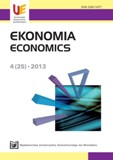Przemiany w branży gier wideo z perspektywy praw własności intelektualnej
Changes in the video games industry from the perspective of intellectual property rights
Author(s): Mikołaj KlimczakSubject(s): Economy
Published by: Wydawnictwo Uniwersytetu Ekonomicznego we Wrocławiu
Keywords: video games; property rights; patents; contracts; opportunism; enterprises’ strategies
Summary/Abstract: Considerations contained in this paper apply to changes that are currently taking place in the video game industry. According to very conservative estimates, the revenue the video game market is expected to grow to 82 billion dollars by 2017. This makes that video game industry, hitherto little explored by economists, can be an interesting subject of study. The main emphasis of this paper has been placed on the analysis of the impact of changes in the perception of property rights, both absolute as well as relative. They affect the performance of many of those involved in the video game industry: producers (who create the relevant product), publishers (dealing with marketing, production and financing physical creation of the game), distributors (involved in the distribution of physical as well as digital), players and other businesses and people from the environment. The paper initially identified general problems that arise from changes in the perception of property rights. Firstly, monetary externalities in a situation of incomplete markets are not fully internalized by the market mechanism. Secondly, the real external effects mean that the markets side effects occur among third parties. Thirdly, feedback can occur between the first two problems, intensifying their activities. Fourthly, in a situation of relative property rights there can be observed the problem of precontractual opportunism, which may cause a breach of property rights during the preparation and negotiation of a contract. Fifthly, there can be observed postcontractual opportunism, which is the engine of breaches of contract after its agreement and conclusion. Next, the paper indicates manifestations of these problems that are taking place in the video game industry: the use of technology restricting the exchange in response to the intensification of piracy, the emergence of adverse selection on many levels (because the video game industry is a network of contracts) or the occurrence of the phenomenon of moral hazard. Next, in the paper there are determined the consequences of these problems which can be expected, and how in such a situation the entities engaged in business may react. One can expect, for example: searching for better protection against imitation and unauthorized copying, increased costs of producers and publishers, increased pressure on subcontractors, negative incentives for innovation, the development of technology security breaches, adverse selection and moral hazard on many levels. In the conclusion the series of phenomena are identified, both negative and positive, that occur or may occur in the video game industry. There might be a reduction in the incentives to invest and develop the industry, followed by an escalation of piracy, rising prices or reduced quality of the products. These effects definitely lead to a reduction in welfare. On the other hand, there are innovations leading to the development of the industry in the directions previously unexplore
Journal: Ekonomia
- Issue Year: 2013
- Issue No: 25
- Page Range: 132-150
- Page Count: 19
- Language: Polish

